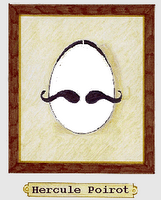
I was watching an Agatha Christy DVD - one of the Poirot stories Granada filmed with the excellent David Suchet playing the pear-shaped, little detective - when one of the characters read out the description of the death of Socrates from Plato.
Suddenly the similarity of Mistress Quickly's description of the Death of Falstaff struck.
I'd never registered the similarities before (although I possibly had read about it).
Why now?
I suspect it had something to do with the performance - the fact that I had heard an actor deliver the description, and that Dame Judy Dench's delivery of the Shakespeare had lodged very firmly in 'd' little grey cells'.
Was it tone of voice, or manner of delivery?
I don't know - but if it struck me, sat in front of a t.v. in provincial Hungary, how much more quickly it would have struck the audience in Shakespeare's London - not just used to listening more carefully, but primed in the classics.
What was Shakespeare up to with the connection?
Two diametrically opposed possibilities pop into my mind.
Either:
Shakespeare is suggesting that Falstaff, like Socrates, has to be 'killed-off' for perverting the youth of the nation - that it is a judicial action on behalf of the authorities (not to mention the playwright) to rid itself of a rotten apple before the whole basket is useless;
Or:
Shakespeare is making it very clear that Falstaff has died a death undeserved and the authorities really should be elevating him to the pantheon of greats for the service he has done in educating the young of the nation in the realities of the world - just like Socrates.
And then that really irritating habit of thought Shakespeare had of 'negative capability' kicks in - you just know he meant both at the same time.
Both Socrates and Falstaff will be remembered long into the future - and the youth of nations not yet formed will admire the disgraceful lack of respect for constituted authority they both have in abundance.
And the rediculousness of comparing the 'great philosopher' with the 'tub of lard' will stick in the minds of the older and wiser.





1 comment:
Only problem here is that Plato hadn't been translated into English in Shakespeare's time.
Post a Comment